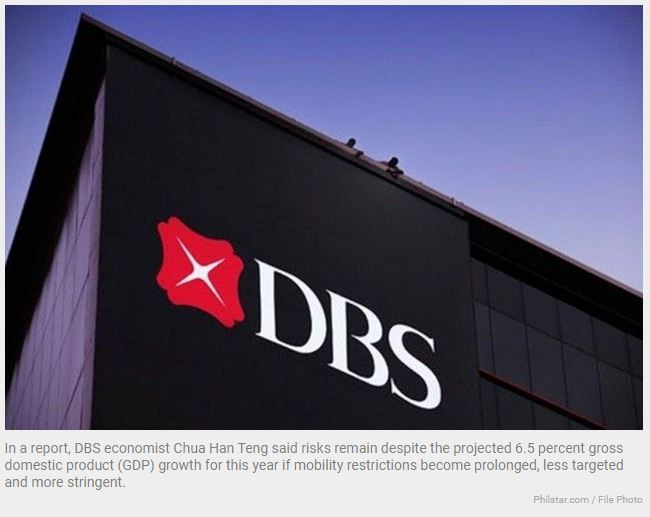Philippines to remain underperformer despite strong rebound – DBS
MANILA, Philippines — The Philippines will remain a regional underperformer despite the strong bounce-back from the pandemic-induced recession due to the rapid virus surge and tough mobility restrictions early this year, according to DBS Bank of Singapore.
In a report, DBS economist Chua Han Teng said risks remain despite the projected 6.5 percent gross domestic product (GDP) growth for this year if mobility restrictions become prolonged, less targeted and more stringent.
“Real GDP will see a slower return to pre-pandemic levels in the second half, even though growth strengthened and surprised to the upside in the fourth quarter of 2021,” Teng said.
The Philippines emerged from the pandemic-induced recession that stretched through five quarters with a GDP growth of 5.6 percent last year, slightly above the government’s five to 5.5 percent target and a reversal of the 9.6 percent contraction in 2020.
“Our base case growth forecast of 6.5 percent for 2022 incorporated the possibility of speed bumps driven by the virus and sporadic tightening,” Teng said.
Teng said fiscal and monetary policies in the Philippines would remain growth-supportive, but would wind back from the very accommodative levels provided during the pandemic.
DBS expects fiscal deficits to be wider than pre-COVID levels, while higher public indebtedness and possible credit rating pressures would challenge policy space with the hawkish US Federal Reserve.
“Philippines would normalize on the recovery, but uncertainty posed by the pandemic threatens to push back the potential tightening timeline from the fourth quarter of 2022, even as the Fed’s hawkish tilt raises capital flow volatility,” Teng said.
According to DBS, vaccinations have yet to reach critical mass in the Philippines, leaving the population and economy vulnerable to COVID transmission.
“The stark contrast in COVID dynamics is seen in the Philippines where caseloads have surged exponentially to record highs beyond the Delta wave but appears to be easing,” Teng explained.
Teng said Philippine economic recovery is highly dependent on domestic demand, notably private consumption, which account for more than 70 percent of GDP, the highest in the region.
The Philippines’ economic recovery… remains beholden to the ebb and flow of healthcare responses. More localized and calibrated virus restrictions are still having a negative impact on retail and recreation mobility, as seen from the sharp dive seen during the Omicron wave in January,” Teng said.
The Singaporean bank sees the Bangko Sentral ng Pilipinas (BSP) normalizing policy rates in the second half from record lows.
“The central bank has some policy room to maintain an accommodative stance given that inflation has cooled within its two to four percent target band. The BSP was a laggard in raising rates during the Global Financial Crisis, beginning only in 2011,” Teng said.
BSP Governor Benjamin Diokno said the Monetary Board is unlikely to touch interest rates in the first half to allow full recovery from the impact of the pandemic.
Source: https://www.philstar.com/business/2022/02/07/2158976/philippines-remain-underperformer-despite-strong-rebound-dbs


 English
English




